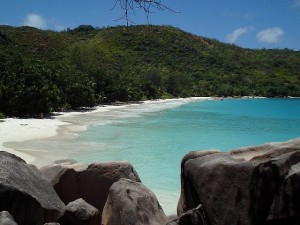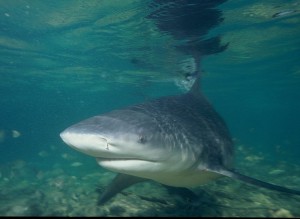Grief and fear have overcome the small island nation of the Seychelles after two fatal shark attacks near the island of Praslin, a shocking occurrence in what were thought to be safe waters.
For primary school teacher Gemma Redmond, 27, and her new husband Ian, 30, a dream tropical honeymoon turned unspeakably tragic on August 16th after a rare shark attack on Praslin’s renowned Anse Lazio beach. Mrs. Redmond sat on the beach while her husband swam just a few dozen feet offshore, and after approximately 20 minutes she heard his desperate cries for help as he was attacked by what is thought to have been an aggressive bull shark. Despite the efforts of a local boat to rescue him quickly, he later died in his wife’s arms from his devastating injuries.
According to Mrs. Redmond, the young couple, who were visiting from Lancashire in the UK, had been told that the country’s waters were safe, and had been attracted to the Seychelles partly due to the islands’ lack of dangerous creatures. Sadly, Mr. Redmond has not been the only recent fatality; on August 1st, a 36-year-old French tourist died of what were thought to be shark bites while diving off Praslin, close to Anse Lazio. According to Michel Gardette, a development official in Praslin, this is simply unheard-of. “I have been diving for the last 40 years and I have never encountered any problems,” he said. “Sharks are actually very rare because they are hunted for their meat and fins.” So rare, in fact, that the diver’s injuries were initially mistaken for boat propeller wounds, according to the French media.
It is certainly true that of the many things that the Seychelles are known for, shark attacks are not on the list. In recent years, this stunning island nation has become a popular upscale holiday destination; the Duke and Duchess of Cambridge’s choice of the luxurious North Island for their honeymoon idyll only added to the country’s allure. In particular, the Seychelles’ second-largest island of Praslin has exploded in popularity for newlyweds, which, despite having a population of just 6,500 inhabitants, can see upwards of 60,000 visitors each year. Must-see natural wonders include the Vallée-de-Mai UNESCO World Heritage Site, a nature preserve virtually unchanged since prehistoric times, and a highly important part of the Seychelles’ tourism-driven economy.
After the death of Mr. Redmond, the Seychelles government worked quickly to address the shark attack, issuing a ban on swimming in five beach areas on Praslin and two nearby islands, St. Pierre and Curieuse. The government has, however, come under scrutiny for not acting quickly enough – in a twist of irony, the honeymooner died on the same day that the government held an emergency meeting to address the previous fatality on August 1st. It may be somewhat understandable, however, that they did not fear an immediate danger to others -prior to these two attacks, the last reported death by shark in the Seychelles was in 1963.
The government of this highly tourism-dependent country has also moved to calm visitors. “It is a rogue shark that has caused a freak accident,” Alain St. Ange, the Seychelles Tourism Board’s director, told the BBC. He has also stated publicly that the shark is being hunted by two experts from South Africa, a country familiar with the danger posed by these predators of the sea. South Africa had a total of eight serious shark attacks in 2010, starting with a horrifying fatality in January, when a Congolese tourist was eaten by a massive shark described by onlookers as “larger than a minibus.”
Hopefully, the shark threat in the Seychelles is due to a single rogue animal, and will not be repeated – or cause irreparable harm to the islands’ reputation, which would cause economic devastation for the Seychellois. As for Mrs. Redmond, her tragic experience has not embittered her towards the country. In a courageous interview given to the BBC, she said that she hoped that the attack would not dissuade other tourists, and that the local people had been “so kind” to her in her time of crisis. “”The last thing I would want is for any of these events to affect the Seychelles Island people, their livelihoods and the tourism in the area,” she said. “It’s a beautiful area, people must come.”
Read the BBC article and interview: Link





